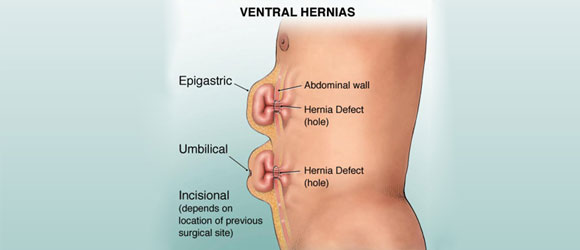Hernia

Hernia is a condition where an organ pushes through the wall (muscle or tissue) holding it in place. Generally the organ pushes through a weak spot in the wall and it occurs due to a strain on the weak point. Hernia can occur immediately or over a long period of time. It can occur both in males and females.
A bulge or lump in the affected area such as groin or abdomen based on type of hernia. This bulge is prominent while standing, coughing or bending
Weakness, pressure or heaviness in the abdomen
Pain or burning sensation at the site of bulge
Extreme pain, nausea, vomiting and constipation which requires immediate treatment in the form of surgery
Acid reflux, heartburn, difficulty in swallowing in case of hiatal hernia
Muscle weakness and strain at the affected area causes hernia.
Muscle weakness can be due to
- surgery or injury
- Chronic coughing
- Congenital defect – failure of abdominal wall to close completely while in the womb
Strain can be due to
- Lifting heavy weight
- Constipation (straining due to bowel movement)
- Pregnancy
- Fluid retention in the abdomen
- Sudden increase in weight
- Coughing or sneezing persistently
- Surgery or injury at the site
Family history
Obesity
Smoking which causes chronic cough
Diagnosis is done on type of hernia
Physical examination for inguinal or incisional hernia
Barium X- Ray or endoscopy for hiatal hernia
Ultrasound for umbilical hernia
Depending on the age and location of the hernia, following are the types:
Inguinal Hernia : This is the most common form of hernia that occurs in the inguinal canal found between the groin and abdomen. The inguinal canal in men has the spermatic cord that passes from abdomen to scrotum. This chord holds the testicles. In women, the inguinal canal contains a ligament that helps hold the uterus in place. This type of hernia is commonly found in men
Hiatal Hernia : In this type of hernia, part of the stomach protrudes through the diaphragm (muscles that help in breathing and separate abdomen from chest). This type of hernia causes acid reflux and heartburns
Umbilical Hernia : This type of hernia occurs in infants below 6 months of age. The intestines bulge through the abdominal wall which is seen at the belly button when the infant is crying. This is generally resolved as the infant grows up (by 1 year) else surgical correction is required.
Incisional Hernia : This type of hernia is caused due to weakening of the abdominal wall due to a previous surgery. The intestines push through the incisional scar and bulge.
Femoral Hernia : This commonly occurs in women in the groin area above the line separating the abdomen and legs. This type of hernia generally leads to strangulation which is a medical emergency so it should not be ignored.
Treatment of Hernia
Laparoscopic Hernia repair
Mesh Repair
Laparoscopic Surgery for Hernia
KeyHole Surgery
Dietary changes for hiatal hernia to treat the symptoms alone
OTC drugs to treat symptoms of hiatal hernia







